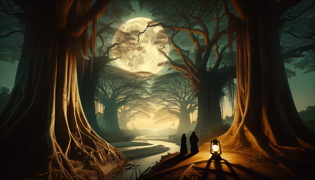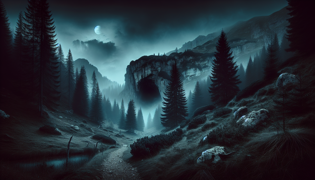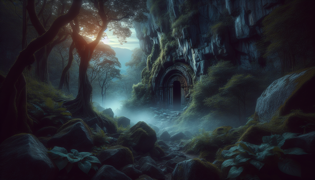Introduction
High on the mist-laden ridges of Guatemala’s western highlands, the air turns still when dusk falls and the sky bleeds lavender into the deep green folds of the Sierra Madre. In those waning moments, villagers say you can hear the soft, sorrowful sound of weeping rise from a hidden cavern—an otherworldly lament that seeps through cracks in the earth and drifts down ancient trails. They call it the Weeping Cave of Quetzaltenango. The story begins centuries ago with Princess Ixchel of the Kʼicheʼ Maya, whose beauty was matched only by her curiosity and her devotion to the rituals of the moon goddess that governed her people’s fate. Betrothed against her will to Pacal the Conqueror as part of a political alliance, Ixchel’s heart belonged to a simple scribe named Hun Iqʼ, whose gentle songs on the flute rivaled the nightingales of the valley below. Their clandestine meetings in moonlit groves and whispered promises by the river became the stuff of hushed legend. Yet when Pacal discovered the pair beneath a canopy of ceiba trees, he unleashed his warriors, and in the blood-stained clearing, Ixchel fell with her beloved’s name on her lips. In her agony she fled into the mountains, guided by the light of the rising moon toward a fissure in the rock. There, wracked with grief and longing, she prayed for the earth to swallow her pain. Legend says the cavern walls answered her, absorbing her tears into their depths, and since that evening, every dusk the cave weeps in her place—each drop a final benediction to a love too profound for death to silence. Today, travelers and lore-keepers gather at dusk beneath whispering pines to hear the echo of her lament in wind-raked corridors and to pay homage to her undying devotion. Some say the cave still holds her spirit: a pale figure drifting on the fringe of moonlight, weeping softly for the world she left behind, reminding us that love’s sorrow can shape the very bones of the earth.
The Forbidden Love
Under the light of a rising moon, Princess Ixchel slipped away from the polished marble of the palace courtyard to the shadowy banks of the Samalá River, where the night air carried the murmurs of hidden devotion. Hun Iqʼ, the palace scribe, waited among the silvered reeds, his wooden flute cradled like a newborn in his hands. They met in silence at first—Ixchel pressing a trembling palm against the flute’s carved surface, feeling the heartbeat beneath its hollow chamber. When Hun Iqʼ raised the instrument to his lips, the haunting melody soared into the star-spangled sky, weaving a tapestry of longing that clung to the princess’s very bones.
He composed each note as a vow, a promise that transcended the rigid protocols of court politics and ancient prophecy. In his music, she heard her own name carried aloft on a current of raw devotion. Against the backdrop of the kingdom’s golden banners and marble columns, their love took root in the quiet places no map could chart. They spoke little—Ixchel fearing betrayal from hidden ears, Hun Iqʼ entrusting his words to the language of melody. The river’s gentle rush bore witness to their clandestine meetings, its waters reflecting the flicker of lanterns that danced like silver fish along shadowed banks.

But power has its eyes, and whispers travel on the wings of jealousy. One night, as the moon slipped behind a veil of cloud, armed guards descended on the river’s edge. The clash of obsidian spearheads against stone rang through the night like thunder, and the music of Hun Iqʼ’s flute was silenced by the harsh reality of steel. Guards seized the princess by her jade-inlaid belt and dragged her back toward the palace, her skirts of woven cotton catching on brambles as she struggled to remain at his side. She turned only once, her wide eyes meeting Hun Iqʼ’s as the lantern light revealed hope tearing away like a bird in flight.
From her gilded prison, Ixchel watched as Hun Iqʼ was banished beneath a cloak of dawn, forced to wander among distant tribes, his flute returned to its maker’s hands. Yet each night, he entrusted his longing to a grove of wild ceiba trees, laying his flute atop their roots so it could drink the dew and carry his sorrow back to the princess in dreams.
This betrayal sowed the seed of her despair. The more the court sought to extinguish their passion, the more her spirit clung to the one who understood her truest song. Her tears, they say, were the first to fall into the unborn cavity beneath the mountain—a sorrow too heavy for palace walls to contain.
Descent into Darkness
After the court’s decree, the corridors of the palace grew colder, as if the very stones recoiled from her tears. Each evening, when shadows lengthened across the marble floors, Ixchel stood at the highest parapet, watching the valley below. She combed the sky for the faintest trace of Hun Iqʼ’s flute song, but only the plaintive cry of night birds answered her. Driven by grief, she abandoned her royal guards one twilight and fled deeper into the highlands, guided by memories etched into her heart—a melody that only the land remembered.
She climbed jagged trails carved by centuries of runoff, her bare feet slipping on moss-slick stones. Clouds drifted across the heavens like silent witnesses to her resolve. When hunger and thirst gnawed at her, she pressed onward, driven by the promise of a reunion only she believed possible. Folktales told of a hollow beneath the peaks where the earth itself wept for lost souls; slack-jawed villagers whispered that the cavern would open only to those whose sorrow matched its depth.

On the third night, she found it: an almost imperceptible fissure in black rock, hidden by curtains of trailing vines. The moment she stepped across its threshold, the air changed—becoming still, heavy with the scent of damp stone and centuries of accumulated tears. A distant drip echoed in the vast shadows. The cave beckoned with a mournful resonance, drawing her deeper until she reached a chamber vast enough to hold the sky itself. Here, water trickled from unseen crevices in the ceiling, pooling at her feet to form a shining mirror.
Ixchel sank to her knees and let her tears join the flow, her sobs echoing against the vaulted roof. Time lost meaning as her grief poured out and merged with the cave’s own sorrowful rhythm. When dawn’s first rays struck the entrance, she lay curled on the cold floor, her tears spent, her voice broken, and her purpose fulfilled. The villagers would later speak of a single white feather drifting to the mouth of the cave—some said it was Ixchel’s cloak, some believed it was a sign from the gods. All agreed it marked the moment she and the cavern became one.
Hun Iqʼ never found her among the ceiba groves. He searched highland villages and riverbanks, following rumors of a flute song haunting the wind. But the melody had changed—becoming a lament carried not by reeds but by stone, a dirge beyond human reach. Heartbroken, he cast aside his flute, swearing to end his own life at the next full moon. Yet when that night came, he found himself at the cave’s entrance instead, drawn by a sorrow he could neither explain nor resist. The cave wept as if to welcome him home, but he turned away, knowing he had lost more than a friend—he had lost his own song.
Echoes of Eternal Lament
As decades passed, the valley around Quetzaltenango prospered, and new families built homes along the slopes of the mountains. But each evening, when the sun dipped behind jagged peaks and the sky bled violet into twilight, travelers paused by the cave’s mouth to hear that mournful call. The echo was faint but unmistakable—a soft, keening sound that slid down the mountainside like living mist. Some claimed to glimpse a pale silhouette at the threshold, her figure outlined by the last streaks of daylight. Others brought offerings: feathers, folded herbs, and small clay fragments engraved with prayers to the moon goddess.
Local guides learned to respect the legend. They told curious outsiders that the cave’s tears kept the mountain fertile, nourishing spring water that fed terraced fields strewn across the highlands. Farmers swore the soil closest to the cavern yielded the sweetest maize and the richest beans, a blessing they attributed to Ixchel’s eternal vigil. Shamanic rituals echoed through the region, where wise women would chant at twilight to honor the princess’s sacrifice and to ask her mercy upon newborn infants.

In time, artists and poets wove the Weeping Cave into their creations. Ballads were sung in market squares, and delicate painter’s scrolls depicted Ixchel’s journey through moonlit forests and into the heart of the earth. Yet even as her story spread beyond Guatemala’s borders, no one could capture the true depth of her sorrow. Tourists brought modern lanterns and cameras, but the cave remained elusive—its voice wondering only for those who listened in silence.
Some elders warn that those who seek the cave purely for spectacle may awaken a deeper sorrow. Legend insists that Ixchel’s spirit tests the sincerity of each visitor. If her pain is met with jest or disbelief, the cave falls silent, doors of stone closing until the mountain deems the world ready to grieve once more. Only those with compassion and a heart attuned to ancient lament can hear the melody of lost love and understand that some sorrow must be carried rather than cured.
Today, as you stand at the brink of dusk beneath Quetzaltenango’s peaks, listen for the drip that rises to meet the first star of evening. If you bring a quiet mind and a gentle soul, you might hear Ixchel’s soft lament—an echo of a princess’s vow that love alive through tears can outlast even the hardest stone.
Conclusion
Generations of Quetzaltecos have grown up with the Weeping Cave’s story woven into their understanding of land and love. Farmers claim the earth itself pulses with Ixchel’s sorrow, while poets still chase the perfect words to describe a grief that defies language. Yet for all its mystery, the legend endures because it speaks to a universal truth: the deepest wounds often leave the most beautiful echoes. When dusk falls and the first star glimmers above the mountain ridges, find a quiet spot near the cave and close your eyes. Let the cool air hush your thoughts, and listen. If your heart aches with even a fraction of the princess’s longing, you will feel her tears ripple through your spirit. In that shared sorrow, we honor a love that refused to die and a soul that found its home in the very heart of the earth. Always, as the world darkens, the cavern weeps—a reminder that beauty and pain are entwined, and that the purest love may demand the sweetest sacrifice.


















